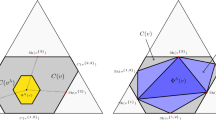Abstract
The Shapley value of a cooperative transferable utility game distributes the dividend of each coalition in the game equally among its members. Given exogenous weights for all players, the corresponding weighted Shapley value distributes the dividends proportionally to their weights. A proper Shapley value, introduced in Vorob’ev and Liapounov (Game Theory and Applications, vol IV. Nova Science, New York, pp 155–159, 1998), assigns weights to players such that the corresponding weighted Shapley value of each player is equal to her weight. In this contribution we investigate these proper Shapley values in the context of monotone games. We prove their existence for all monotone transferable utility games and discuss other properties of this solution.
Similar content being viewed by others
Notes
Another type of weighted Shapley value is defined in Kalai and Samet (1987) where, besides having weights, the players are partitioned and there is an ordering of the elements of the partition such that only the players in the ‘highest level’ of a coalition share in the corresponding dividend.
Note that this is not a weighted Shapley value because the weights, in general, will be different for different games.
Queueing games being 2-games follows directly from (3) in the proof of Lemma 1 in Maniquet (2003).
References
Ambec S, Sprumont Y (2002) Sharing a river. J Econ Theory 107:453–462
Aumann RJ, Drèze JH (1980) Cooperative games with coalition structures. Int J Game Theory 3:217–237
Billot A, Thisse JF (2005) How to share when context matters: the Möbius value as a generalized solution for cooperative games. J Math Econ 41:1007–1029
Brânzei R, Fragnelli V, Tijs S (2002) Tree-connected peer group situations and peer group games. Math Methods Oper Res 55:93–106
Chang C, Kan C-Y (1994) A study on decomposable convex games. Games Econ Behav 7:35–38
Curiel I, Pederzoli G, Tijs S (1989) Sequencing games. Eur J Oper Res 40:344–351
Feldman B (1998) The powerpoint. Manuscript:Scuder Kemper Investment
Feldman B (1999) The proportional value of a cooperative game. Manuscript: Scuder Kemper Investment
Franklin J (1980) Methods of mathematical economics: linear and nonlinear programming, fixed-point theorems. Undergraduate texts in mathematics. Springer, New York
Graham DA, Marshall RC, Richard JF (1990) Differential payments within a bidder coalition and the Shapley value. Am Econ Rev 80:493–510
Harsanyi JC (1959) A bargaining model for cooperative \(n\)-person games. In: Tucker AW, Luce RD (eds) Contributions to the theory of games IV. Princeton University Press, Princeton, pp 325–355
Hart S, Mas-Colell A (1988) The potential of the Shapley value. In: Roth AE (ed) The Shapley value: essays in honor of L. S. Shapley. Cambridge University Press, Cambridge, pp 127–137
Hart S, Mas-Colell A (1989) Potential, value and consistency. Econometrica 57:589–614
Homans CG (1961) Social behavior: its elementary forms. Routledge & Paul, London
Kakutani S (1941) A generalization of Brouwer’s fixed point theorem. Duke Math J 8:457–459
Kalai E (1977) Proportional solutions to bargaining situations: interpersonal utility comparisons. Econometrica 45:1623–1630
Kalai E, Samet D (1987) On weighted Shapley values. Int J Game Theory 16:205–222
Kalai E, Samet D (1988) Weighted Shapley values. In: Roth AE (ed) The Shapley value: Essays in honor of Lloyd S. Shapley. Cambridge University Press, Cambridge, pp 83–89
Levínský R, Silárszky P (2001) Global monotonicity of values of cooperative games: an argument supporting the explanatory power of Shapley’s approach. In: Holler MJ, Owen G (eds) Power indices and coalition formation. Springer, Dordrecht, pp 289–301
Littlechild SC, Owen G (1973) A simple expression for the Shapley value in a special case. Manag Sci 20:370–372
Maniquet F (2003) A characterization of the Shapley value in queueing problems. J Econ Theory 109:90–103
Monderer D, Samet D, Shapley L (1992) Weighted values and the core. Int J Game Theory 21:27–39
Ni D, Wang Y (2007) Sharing a polluted river. Games Econ Behav 60:176–186
Ortmann KM (2000) The proportional value for positive cooperative games. Math Methods Oper Res 51:235–248
Peleg B, Sudhölter P (2003) Introduction to the theory of cooperative games. Kluwer Academic Publishers, Boston
Roth AE (1979) Proportional solutions to the bargaining problem. Econometrica 47:775–778
Selten R (1978) The equity principle in economic behavior. In: Gottinger H, Leinfellner W (eds) Decision theory and social ethics: issues in social choice. D. Reidel Publishing Company, Dordrecht, pp 289–301
Shapley LS (1953a) Additive and non-additive set functions. Dissertation, Princeton University, Princeton
Shapley LS (1953b) A value for \(n\)-person games. In: Kuhn HW, Tucker AW (eds) Contributions to the theory of games II. Princeton University Press, Princeton, pp 307–317
van den Nouweland A, Borm P, Tijs S (1996) A game theoretic approach to problems in telecommunication. Manag Sci 42:294–303
Vorob’ev NN, Liapounov AV (1998) The proper Shapley value. In: Petrosyan L, Mazalov M (eds) Game theory and application, vol IV. Nova Science, New York, pp 155–159
Author information
Authors and Affiliations
Corresponding author
Additional information
Miroslav Zelený was supported by the research project MSM 0021620839 financed by MSMT.
The preliminary draft of this paper was presented at the 19th Stony Brook Game Theory Festival of the Game Theory Society. We appreciate valuable comments from the workshops participants, in particular from Sergiu Hart. We also thank Jean Derks for valuable comments on a previous draft.
Rights and permissions
About this article
Cite this article
van den Brink, R., Levínský, R. & Zelený, M. On proper Shapley values for monotone TU-games. Int J Game Theory 44, 449–471 (2015). https://doi.org/10.1007/s00182-014-0439-5
Accepted:
Published:
Issue Date:
DOI: https://doi.org/10.1007/s00182-014-0439-5



